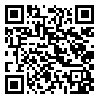BibTeX | RIS | EndNote | Medlars | ProCite | Reference Manager | RefWorks
Send citation to:
URL: http://tumj.tums.ac.ir/article-1-742-en.html
Background: Depressive disorders in children and adolescents are chronic and highly morbid. Few studies are carried out on antidepressant drugs for depressed youths, especially specific noradrenergic agents. Reboxetine is a selective norepinephrine reuptake inhibitor. This study was designed to evaluate the effect of reboxetine in childhood and adolescent depression.
Methods: Twenty patients of both genders, aged 7-17 years old, with major depressive or dysthymic disorders, as classified by the fourth edition of the Diagnostic and Statistical Manual of Mental Disorders (DSM-IV), participated in an 8-week clinical trial before-after study of reboxetine. Clinical semistructured interviews, based on the Kiddie Schedule for Affective Disorders and Schizophrenia for School-Aged Children (K-SADS), were carried out. Reboxtine was initiated at a dose of 1 mg/day and increased up to 6 mg/day. Patients were assessed for changes in: depressive symptoms using the Children's Depression Inventory (CDI) and global functioning by the Children's Global Assessment Scale (C-GAS). Side effect questionnaire was also administered.
Results: There was a significant decrease in the ineffectiveness subscale (C factor) of CDI (p=0.006). Although the CDI scores decreased by 32.69%, this change was not significant (p=0.39). No significant change in C-GAS (p=0.2) was observed. Adverse effects were relatively mild to moderate and transient. The most common adverse effects were decreased appetite and sedation.
Conclusions: Reboxetine is relatively well tolerated and improves feelings of ineffectiveness among depressed children and adolescents however it does not improve all depressive symptoms. Double-blind, placebo and active comparator controlled studies and larger sample sizes are indicated.
| Rights and permissions | |
 |
This work is licensed under a Creative Commons Attribution-NonCommercial 4.0 International License. |





